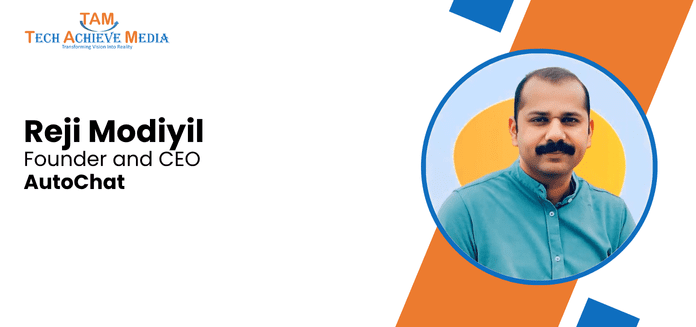As automation and conversational AI become essential tools for growth, a new wave of SaaS innovation is emerging from India’s non-metro cities, driven by real-world problems and powered by accessible tech. Platforms like AutoChat are enabling over 5,000 MSMEs and startups to build customer journeys that are mobile-first, vernacular, and deeply local, often over WhatsApp. In this evolving landscape, Reji Modiyil, Founder and CEO of AutoChat, shares how regional hubs, no-code AI tools, and trusted data practices are unlocking enterprise-grade capabilities for small businesses across the country.
TAM: How do you see regional innovation hubs outside metro cities shaping the next wave of SaaS in India?
Reji Modiyil: There’s something truly remarkable happening beyond the metros. In cities like Kochi, Jaipur, Indore, and Guwahati, we’re seeing raw, problem-first innovation. Founders there are building not for hype but for survival, solving deeply local pain points with efficiency. The overheads are lower, the teams scrappier, and the focus razor-sharp on delivering real value. These hubs are giving rise to SaaS products that are more inclusive, mobile-first, and India-aware, especially relevant for the MSME economy. What’s more, access to cloud infrastructure and remote collaboration tools has flattened the geography barrier. The next SaaS unicorns may not come from Koramangala, they might come from Coimbatore or Surat.
Also read: Balancing Collaboration with Data Sovereignty – Harvinder Singh, Confiex Data Room
TAM: With over 5,000 businesses using AutoChat, what patterns are you seeing in how MSMEs and startups are adopting automation and conversational AI, especially via platforms like WhatsApp?
Reji Modiyil: The most encouraging trend is that MSMEs no longer see automation as a luxury, they see it as survival. Many of our users start by automating simple WhatsApp responses or cart recovery flows. But very quickly, they evolve, creating full-stack customer journeys: lead capture, appointment booking, feedback, support, and even upsell. What’s fascinating is how vernacular, visual-first, and voice-integrated flows are becoming more common. These businesses want tools that work like them, simple, intuitive, fast. And they’re getting creative with it. We’re seeing a florist in Agra and a clinic in Rajkot using the same AI flows as a D2C brand in Bengaluru. That’s real democratization of tech.
TAM: As AI becomes more accessible through no-code tools, how do you think this will change the role of traditional developers in SaaS product development over the next five years?
Reji Modiyil: I think we’ll see a beautiful shift, from builders to orchestrators. Developers won’t disappear, but their roles will evolve. With no-code and AI-enabled platforms, they won’t be writing repetitive UI forms or managing databases, they’ll be architecting logic, workflows, and integrations. The focus will move from syntax to strategy. For SaaS startups, this means faster MVPs, quicker iteration cycles, and cross-functional teams that can prototype without handholding. At AutoChat, we’ve seen even non-tech founders build rich automations using our flow editor. Developers will increasingly become system thinkers, and that’s a good thing for innovation.
TAM: AutoChat sits at the intersection of AI, automation, and customer engagement. How do you balance innovation with privacy and compliance, especially when operating across geographies with different data laws?
Reji Modiyil: Trust is foundational to what we do. You can’t build long-term relationships between brands and customers without data responsibility. At AutoChat, we follow a “privacy by design” approach, encryption, consent-first flows, and region-specific compliance layers are built into the product from the start. For example, our EU clients get GDPR-aligned data handling automatically. We also make sure businesses are educated, we offer templates, checklists, and reminders to help them stay compliant. It’s not about box-ticking, it’s about empathy. If automation is to truly serve MSMEs, it must be designed with integrity. That’s how we see it.
TAM: The Meta Tech Partner badge is a big milestone. What does this partnership enable in terms of access to technology, support, or future integrations that independent SaaS players might struggle to unlock?
Reji Modiyil: Being recognized as a Meta Tech Partner has given us a strong early-mover advantage. We were among the first to roll out Business oriented WhatsApp automation for our users, well before it became mainstream, because we had early access to the tools, documentation, and APIs others were still waiting on.
This partnership also ensures we’re building on a stable, secure, and future-ready foundation. We get access to beta features, direct technical support from Meta, and alignment with their evolving roadmap. For MSMEs, this translates into faster implementation, better delivery rates, and seamless integrations with high traffic platforms like Facebook and Instagram, without the complexity. For us at AutoChat, it’s not just a badge, it’s what allows us to stay ahead of the curve and bring enterprise-grade automation to small businesses who’ve traditionally been left out of the tech conversation.







